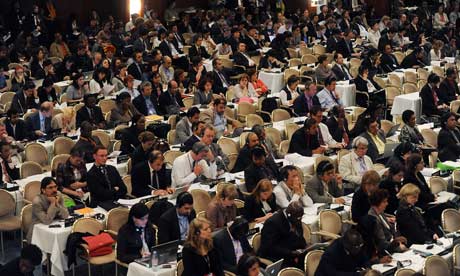Rio+20 must 'unenvironmentalise' green issues, says G77 negotiator
Focus should shift to economics to make notion of sustainability more widely accepted, says senior organiser for Brazil

Next year's Rio+20 United Nations summit must "un-environmentalise" the world's approach to sustainability so that it can reach out beyond the converted, according to a senior organiser in the host nation.
André Corrêa do Lago, the chief negotiator for Brazil, said the once-in-a-generation gathering should focus on economic opportunities so the principles of sustainability are accepted beyond the "usual suspects" of environment ministries and green NGOs.
The effort to broaden the principles of the original 1992 Rio Earth summit are likely to prove controversial. Supporters say the world needs a new, more inclusive approach to sustainability that emphasises the benefits to humanity because current efforts to protect nature are failing. Critics warn the increased emphasis on technology and markets will simply greenwash destructive levels of consumption and development.
The first Rio summit 20 years ago is seen as one of the most ambitious gatherings in the history of the United Nations. More than 100 heads of state signed up to a raft of actions, including efforts to halt the deterioration of the ozone layer, tackle climate change and reduce the loss of biodiversity. These issues have taken centre stage in international negotiations for the past two decades.
The follow-up in June 2012 will also try to set the global agenda for the next 20 years, predicted do Lago, but he said the outcome would take a different shape.
"There is fatigue of conventions. We have enough," he said. Instead, he anticipates measures on water, energy and sustainable cities, and more discussion on technology and work on how to develop a "green economy", while eradicating poverty.
The shift partly reflects a change in the global balance of power. Twenty years ago, the west – particularly the US – dominated the world economy and political agenda. Today, such older industrial powers are struggling to recover from the 2008 financial crisis while fast developing nations, like China, India and Brazil are in the ascendant.
But a gap has opened up as the former group lose influence, while the latter are reluctant to accept more responsibility.
"I think that this conference may symbolise a moment in which these large emerging economies have more clout. There is no doubt about that," said de Lago, who is also chief climate negotiator for the G77+China UN grouping of developing countries. "This is misinterpreted by some developed countiries as a moment when we must assume more obligations. China, India, South Africa and Brazil are fully conscious that we are developing countries. We are convinced that we cannot be compared to countries that have financial and technical circumstances that are more important than ours."
Disputes between developed and developing nations are partly to blame for the dire progress in UN climate negotiations, which were also started by the 1992 summit. After the acrimony of talks in Copenhagen in 2009and the weak outcome of Cancún last year, there is a danger that another poor result in Durban this winter could undermine the entire UN negotiating process and turn the follow-up Rio summit into a crisis meeting to rebuild the multilateral framework.
The Brazilian diplomat said he remained hopeful of a climate deal this year – particularly if developing nations can find common ground with Europe – but admitted a bad outcome could contaminate next year's gathering.
"Durban will have an impact on Rio. If it goes well, people will arrive in Rio trusting the multilateral system. If it fails, people will arrive maybe with the necessity of regaining trust in the multilateral system."
Even if the hosts can stick to their desired agenda, the emphasis on technology and "ecological service payments" has already alarmed many environmental commentators, who feel core values are being diluted and losing out to pressure from big corporations.
The Brazilian said the change of focus was a sign of the times. In 1992, environmentalists, he said, were the outsiders who were very vocal because they had to make their voices heard. But now, their views were mainstream and the priority was to for them to become a majority.
"It is like an election strategy. There is now a core of 30% that is sure to vote for you. Now, we must go for the others to get over 50%," said do Lago. "We need to get the people who make the big decisions to take environmental factors into account."
A furious debate looks likely to ensue between those calling for traditional protection for nature and those looking to collaborate with companies, markets and accountants in the creation of a green economy.
One NGO that has shifted is the US group Conservation International.
"Anyone honest would have to say we are totally failing. We need to recallibrate the development model," said Peter Seligmann, the founder of Conservation International, during a visit to Beijing last week. "We had the wrong mission. We can't just protect biodiversity. We must show it is essential for humanity."
His organisation – which was always close to major institutions – is now devoting the bulk of its resources to developing a green economy.